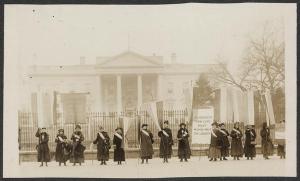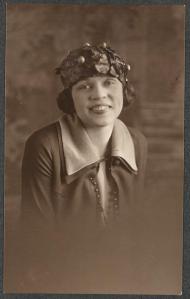A particularly dramatic, historical example has been making the rounds by e-mail and showing up on blogs and campaign websites as we move into the last weeks before the mid-term election. [See, for instance, this recent post in AAUW Dialog, or this page for Henrietta Dwyer] It’s the story of the “Night of Terror” endured by 33 members of the National Women’s Party on Nov. 15, 1917.
The violence turned on Lucy Burns, Dora Lewis, Alice Cosu, et al. because of their refusal to back down from the demand for women’s suffrage, belied the anti-suffrage forces’ professed regard for women’s “ladylike” dignity, and the alleged desire to “protect” women from the coarse, rough “men’s world” of politics. The real issue, it seems, was that of control. When milder forms of social control failed, harsher forms were used. (Domestic violence, which is also about power and control, operates according to that same fundamental principle.)
The story of these women’s fight — literally — for the right to be considered adults and citizens of their own country is deeply moving. So moving, in fact, that local chapters of the League of Women Voters, the AAUW, labor unions, friends, relatives, colleagues and fellow citizens have felt impelled to pass along the powerful text and its linked images. It serves as a powerful reminder that a right which many contemporary women may treat, frankly, pretty casually was not won easily or cheaply.
In fact, the story provides a fascinating illustration of the metamorphosis of a textual tradition, and the ways that metamorphosis can damage as well as preserve the memory needed to preserve women’s history, along with its main content.
Connie Schultz’s column “And you think it’s a pain to vote” appeared February 19, 2004 in the (Cleveland) Plain Dealer. (The text is reprinted by permission in her 2006 anthology Life Happens and other unavoidable truths, which can be previewed at Google books.)In it she refers to the 2004 HBO film Iron-Jawed Angels, directed by Katjia von Garnier, which tells this long-ignored militant side of the struggle women waged for the vote in the United States. (The existence of this film continues to surprise readers of this viral text, and to excite interest.)
Somewhere along the line, someone added images to the text they passed on, evidently from the extensive collection of the records of the National Women’s Party held by the Library of Congress. The images of Inez Calderhead and Nell Mercer are not among those in general circulation, perhaps because these African-American members of the NWP are not mentioned in the text by name. They too, however, were among those jailed for the cause of suffrage.
Depending on the version with which one begins, it can take some time to retrieve Schultz’s name and her link to the text. Many transmitters assume the author is Anonymous. I’ve yet to find a credit for the illustrated version. References to the recency of the film, the author’s personal involvement with voter registration, and her account of meeting Geraldine Ferraro have fallen out of the tradition. Information about the release of the HBO film on DVD has crept in. Different redactions present the story as concerning “our mothers and grand-mothers” or “our grandmothers and great-grandmothers;” versions differ in their specific pleas for taking voting more seriously. Most urge readers to share the information. Some invite skeptics to check out the facts (at least two different online truth-or-fiction sites have dealt with the material: Truth or Fiction.com and Snopes)All that in just 6 short years. (Just imagine what could happen to a story in 90 — or 900.)
Readers who are interested in learning more about Alice Paul, the NWP, and the later, militant phase of the suffrage movement in the US might want to check out:
- The Alice Paul Institute
Jailed for Freedom by Doris Stevens on Project Gutenberg, a first-person account of the suffrage campaign
The Library of Congress’ Suffrage Collection, and in particular the
Essay on Tactics used by the suffragists
The Women’s Center has tentatively scheduled a screening of Iron Jawed Angels for Friday, Oct. 29, 7:00 p.m., in the Women’s Center, pending acclamation of that date and time by the many students who have expressed interest in seeing the film.



